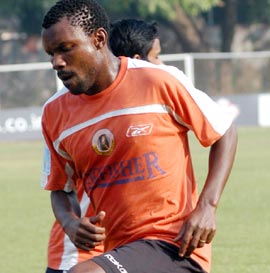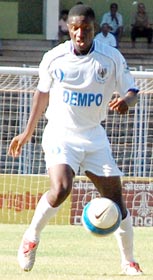The game is over. Samuel, sporting a Chelsea jersey under the faded green sports jacket, waits for his chance to have a word with the manager, hand him the file of required documents. When one of the team management asks him for the contact number, he fumbles, and produces the card of the hotel he's staying in. He has flown in from Ivory Coast, out of Africa for the first time and is not fluent in English.
Football is the first, perhaps the only, sport back home. But Samuel, and many like him, wander over to India for a shot at professional football. Some have agents, some friends, some only their feet to do the talking.
"India is a big hope for Africans," says Adeshina Sadiq, a Nigerian. He once came to India with a similar dream, played for Mumbai club Mahindra United, but the disillusionment with the Indian system and diminishing chances of going to Europe saw him quit the game and settle for a technical job in the city.
"Everyone you talk to will give you a different reason why they came to India to play football," says South African international Macdonald Mukansi, currently with one of the biggest clubs in the country-East Bengal.
"The youngsters they are more prepared to explore. A lot of them want to escape the conditions -- like poverty and unhappiness -- in Africa and play outside. I have played out of Africa since I was 21-22; I don't have happy memories of playing in South Africa.
"I'm 32. For me, football is now like employment, a career," adds Mukansi, who has played for CSKA Moscow and played football in Cyprus, Greece and Bulgaria.
 "I go where I am wanted. In Africa, it is difficult to get into the national team if you haven't played abroad," says Sadiq.
"I go where I am wanted. In Africa, it is difficult to get into the national team if you haven't played abroad," says Sadiq.
Chidi Edeh, another Nigerian, and one of the stars of the I-League (formerly known as the National Football League in India) vouches the importance of moving out.
"In Nigeria we play football from a very early age. I started when I was seven and we used to play while going and coming back from school. Those who are serious about their football move outside, it is more respectful when you have played in a foreign league and go back to Nigeria."
Former Mahindra United and current Mumbai FC coach David Booth, having worked in a coaching progamme in Ghana for five years, says that the attractiveness of the English Premier League and the large presence of Africans there is inspiring more and more of their players to move out.
"They will go wherever they get a chance," says the Englishman. "All the youngsters want to play outside. When they see their players do well in European teams like Chelsea it gives them an incentive to move abroad for better prospects."
At Mumbai FC, Booth has brought in players from Ghana, two of whom - Michael Osei and James Dissimariah -- have played with Michael Essien. Osei was Essien's teammate in the junior Ghana while Dissimariah played at the same club, though a few years junior to the Chelsea star, and both have seen Essien rise through the ranks.
"When we see our club-mate doing so well, it inspires us to follow his footsteps," says Dissimariah. "Everyone wants to gain experience, to be a professional player you can't stay at your club and country and expect to progress."
Though India is ranked way down in the FIFA rankings, Africans footballers are coming to the country in numbers; they see India as a springboard to their European aspirations.
"We feel it is easier to play in Europe if we play in India," says Churchill's Congolese striker Mboyo Iyomi.
"Money is not the parameter. A lot of teams in African countries like Algeria and Egypt pay more than the Indian clubs. But we are thinking two-three years down the line -- if we play in India, we might get noticed more and it could be easier to go to Europe."
Arsenal, Barcelona, Chelsea -- the ambitions are lofty, and the players are ready to do the hard yards.
But the big clubs will still be out of reach, feel the experienced players like Mukansi and Sadiq.
"India cannot be a middle step to Europe," says the South African. "It can help players get to better clubs in Asia-places like Malaysia or Singapore. To play in Europe you have to start with smaller countries like Macedonia and Belgium."
Not everyone can get the lucky break. Dudu Omagbemi spent a good deal of his prime in India before he could get a Polish team interested in him and Ranty Martins, after three years of leading the attack for Dempo, will move on to Ireland next season.
Innumerable Africans have made an impact on Indian football, ever since the pioneering smiling presence of Chima Okerie. In four of the past five years an African has topped the list of highest scorers in India -- Churchill's Odafe Onyeka Okolie is the latest addition with Dempo strikers Edeh and Martins close behind.
And like most club sports, the spotlight is on the foreigners.
"In Nigeria, no one knows who Odafe is," says prolific Churchill star Odafe Onyeka Okolie. "I'm more famous here. There are a lot of good players there, in India I'm special."
"In the end that's what we all play for," adds Edeh. "We all want to play in packed stadiums and have people cheer our name. It's nice to have fans over here, nice to be a star."
With the stardom, and talent, comes responsibility. More money in the Indian League has meant that teams are prepared to spend more, the number of foreign players has increased from three to four in a squad and on the rise.
"I think there is too much pressure on the foreign players here," ventures Edeh. "Playing in India is very difficult. There are a lot of expectations. It used to be even more difficult when I landed here first; I found it difficult to cope, but have adapted well now."
Like Indian IT professionals, footballers are fast becoming the most visible product of Africa. It is the second largest continent, after South America, to export football talent around the world.
Last season, three-fourths of the English Premier League (richest league in the world) teams fielded at least one African player in their line-up. India is taking a piece of that global pie, and with the country in the process of rebuilding the game, African skill is playing a role.
"The African players are strongly built, they can bull doze their way in the Indian League," says Henry Menezes, former India goalkeeper, who scouts talent nowadays.
 "It depends on how the players fit into the team," adds Booth. "When we hire foreign players we already know their capability; it is very important to know the standard of players you are hiring.
"It depends on how the players fit into the team," adds Booth. "When we hire foreign players we already know their capability; it is very important to know the standard of players you are hiring.
"I have spent some time in Ghana and know for sure that they are honest workers. Of course, African players bring different things like strength, speed, power, agility and natural ball skills, it depends on how you harness them."
Apart from fitting the bill in the team, playing Africans also make more business sense rather than hiring the exotic South American talent.
"Yes, the African players come cheaper," says Menezes. "They are more prepared to move out of their country and come to Asia. The leagues in South America are stronger so the players there are more reluctant. The Brazilians who are prepared to come are from mediocre leagues and the agents take the cream.
"Also, climatic conditions are more suitable for the African players. They find it easier to adapt--Europeans can't last in our heat and humidity-and most of them speak English."
With the talent draining from Africa, there is an argument that the national teams are struggling. But African national teams never had it so good before. The smaller continental teams are so competitive that in the 2006 World Cup in Germany, countries like Ivory Coast, Togo and Angola displaced African giants Cameroon, South Africa and Nigeria.
Of the five teams from the continent, one of them Ghana -- progressed to the round of 16.
"Football will not move out of Africa," says 29-year-old Abdulateef Seriki. "There is depth of talent in Africa; with our teams doing well in the World Cups more and more children are playing it. African countries are doing very well in the under-19, under-17 competitions as well."
A testament to that is the fact that every member of the Senegal team, which stunned defending champions France in the 2002 World Cup, had played in European Leagues.
The EPL and La Liga will be depleted in their absence, as all the teams have released their players for the African Nations' Cup, which will kick-off in Ghana on January 20. The Essiens, Didier Drogbas and Samuel Eto'os will then not only bring back European experience and finesse for their countrymen, but also stronger desire and an inspiration to be the best.
While the Africans are fuelled with a desperate zeal to go somewhere, anywhere, India is serving as a path to that theatre of dreams.







 © 2025
© 2025